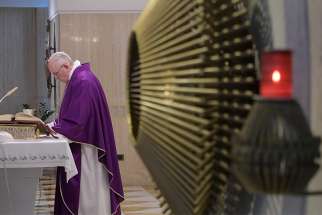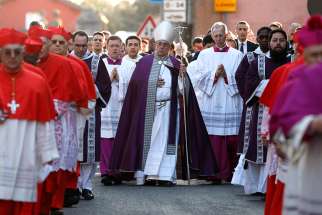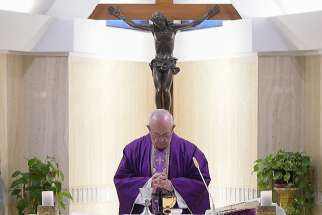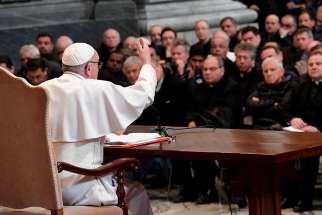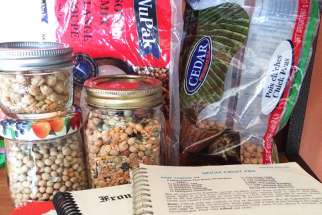Francis Campbell: Fact and fiction of Lenten fasting
Speaking Out: What I learned about fasting
Memento mori: ‘Remember your death’
The start of every new season is exciting and full of possibilities. Think of how happy people are when they see the first signs of spring, or, when the first day of school arrives, or, for baseball fans, the excitement they feel on the day of the season opener.
Medieval Christmas a time for feasting
For your average serf of medieval Europe, Christmas was a pretty good deal, but not really a big deal.
Prayer for peace in Congo, South Sudan a call to action, cardinal says
Pope's homily: Feel hunger and cover it up with a smile this Lent
Pope's homily: True fasting is helping others
True fasting is helping your neighbour; while false fasting mixes religiosity with dirty deals and the bribes of vanity. That was the message of Pope Francis at the morning Mass at the Casa Santa Marta on Friday.
My Lent with Pulse Pledge
I took the Pulse Pledge during Lent and found myself reflecting on how something so small could actually make a difference.
Lent is a season of unsettling lessons learned
Lent has a way of unsettling us, of shaking up our easy routines and making us question what more we should be doing as part of our Christian obedience.
Holy Week fast for D&P
A week without solid food isn’t going to fill the $5-million hole in the Canadian Catholic Organization for Development and Peace’s budget, but Kaitlyn Duthie-Kannikkatt felt she had to take on a Holy Week fast to protest CIDA cuts to the Catholic movement.
The 22-year-old Carleton University student lived on nothing but tea, water and juice until Easter Sunday even while working on her graduating thesis in the global politics program. By mid-week her protest had raised almost $1,400 for D&P.
“The fact that these cuts took place, or we heard tell of them, during Lent is really telling,” Kannikkatt told The Catholic Register. “Being that time of year, it provided an opportunity for the (D&P) membership across the country to get in touch with this issue in a more spiritual and connected way.”
On Good Friday, Kannikkatt was joined on her fast by almost 300 people who vowed to dedicate their fast to D&P. They will give money they would otherwise have spent on food to the Canadian bishops’ development agency while also writing letters to the government to protest a 65-per-cent cut in CIDA funding for 2011 to 2016.
The member actions have inspired the agency’s 60-plus employees, said D&P program co-ordinator Siobhan Rowan.
“It’s been quite incredible and very heartening,” Rowan said. “And it makes it all the harder to think of what we’re going to lose.”
Kannikkatt has written letters to Prime Minister Stephen Harper and International Co-operation Minister Bev Oda asking for reasons behind the funding cut, but has yet to receive a reply.
“Fasting throughout the centuries has been used as a really powerful means of resistance,” said Kannikkatt.
Citing Indian leader Mohandas Gandhi, Kannikkatt doesn’t believe fasting can be easily classified as either political or spiritual.
“Hundreds of members across the country are going to be joining me in this fast,” she said.
“Fasting together, in solidarity with each other, I think that is an incredible example of the Spirit moving through the people involved in this organization as well as making a powerful statement about the politics behind it.”
Kannikkatt’s final paper is about how a corporate social responsibility program run by a Canadian mining company in Guatemala is affecting development prospects for the local community. After graduation she is travelling with a D&P delegation to the Rio+20 United Nations conference in June.
The idea that the current government is more interested in charity than justice, more interested in corporate image repair than democratic change has the employees of D&P calling for action to confront the Conservatives on their development policy, said Rowan.
There’s no way of knowing precisely how many people working with HIV-positive slum dwellers in Africa or helping poor farmers in Haiti are about to lose their jobs because D&P funding has dried up, said Rowan. In many cases laying off the workers in partner organizations will dismantle years of patient, slow work and throw skilled people on the street in countries with no social safety net, she said.
In Ottawa, Kannikkatt isn’t complaining about hunger pangs. She’s thinking about the future of the movement.
“It means we’re going to have to start seeing how we can work differently with our allied organizations in the ecumenical world and in the secular world — see how we can combine our efforts a little bit more,” she said.
“Also we have to see how we can speak out with a more collective voice against this trend in the government away from good, solid, trusted development work that organizations like Development and Peace do to something much more problematic.”






